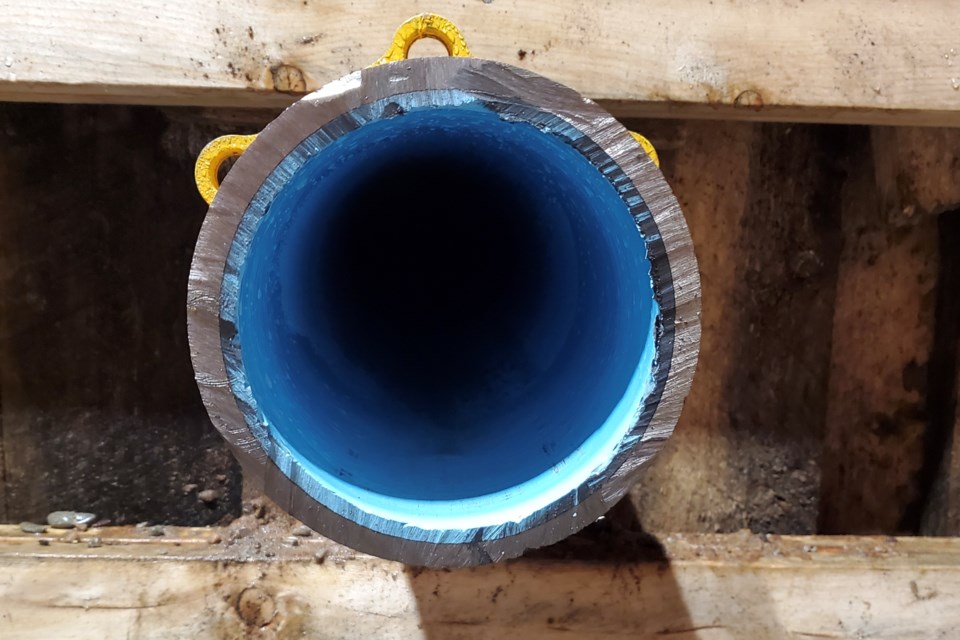PUC Services Inc. is seeing a whitewater cataract of potential cost savings in a new, robot-delivered technology that strengthens and rehabilitates failing water mains.
The utility services company, wholly owned by the City of Sault Ste. Marie, is setting up a new subsidiary to help deliver the pipe-relining technology to other utilities around the province, president and chief executive officer Rob Brewer tells SooToday.
"It's a product developed by a company in the U.K. called Resiline," Brewer says. "The product was originally developed by 3M. When we looked at it, it really hit a lot of the key things that we seek to do."
"Outside of Sault Ste. Marie, it's our intention to develop a business around that in Ontario. We are developing some agreements with Resiline and with one of their Canadian distributors. We expect this summer to have a number of smaller pilot projects on the go," Brewer told us.
Mark Faught, PUC's director of finance, told a recent board meeting that the water utility currently has 150 kilometres of pipe in need of costly excavation and remediation.
"PUC recently pilot-tested an innovative lining achieving 240 metres of lined pipe in three days. This work was completed at significantly reduced customer impact, lower cost to comparable methods, and with an expected improved end result," Faught reported.
"When a water main is getting aged and starts to fail, we get holes in it. That's when we see water main breaks, when we get the freeze-thaw cycle," Brewer told SooToday.
"The traditional method is to open that ground up and replace the water main. There's times when that's still required, when you've got things like service lines that are degraded, or if we have to put a bigger water main in."
Brewer says PUC has been doing some relining of water mains, on and off over the past four years.
"But what we've been moving toward more recently...is to actually strengthen the pipe in the ground by putting a polymer inside of it, as a lining."
"It coats the pipe, so we've got now a very clean surface that improves water quality, improves water flow because there's less resistance, and then it adds structural integrity to the pipe."
"It adds upwards of about 50 years to the life of that pipe."
"What that does for us is it allows us to, without having to open up the entire road to get at those pipes, to rehabilitate those water mains."
"It's a much lower cost alternative to doing traditional open-cut, and it's much less impact on customers."
"Digging up a road, they're there for months. In this case, we can get in and out within three days."
"We send a robot down through the pipe. It sprays the polymer as a liner as it's travelling down the pipe."
"It allows us to return service to those customers the same day that we take them off."
"On a Monday morning, we'll turn the water off, we'll run a cleaner down there, which is a process we do to make sure that we've got any loose metals out of there."
"Then we run the polymer through it. That evening, you can get the water back on, so that people can have showers and all the rest of it."
"We put in a place a boil-water advisory until we can get tests back safe. That usually takes a couple of days, but the inconvenience to customers is very minimal, compared to ripping up their street, or having us present there for months while we do the other, traditional lining."
Brewer says the cost of polymer-remediated pipe is about 25 to 30 per cent of the cost of traditional excavation and replacement.
There will still be times, Brewer says, when things will still be done the old way, for example if the city is already digging up roads to do sewer rehabilitation.
So this could save PUC millions of dollars?
"Tens of millions," Brewer corrects us.
"Most of our pipe is infrastructure that was put in between 1950 and 1980. It's all starting to come of age and it's doing it in a rapid way, so we've got a big chunk of our infrastructure that needs replacement."
"We see this a huge opportunity to try to maintain reasonably priced water."
Already offering some of the lowest-cost water produced in northern Ontario, Brewer promises: "We don't end up with increases."
And are these polymers safe to be carrying our drinking water?
"It's all approved through public health and the [Ontario] Ministry of the Environment, Conservation and Parks. The water treatment and drinking-water industries are very highly regulated. These are products that have gone through extensive testing."
"There's extensive use of safe polymers throughout the drinking-water production industry. This is just another safe one."
"It does provide some significant savings. And the beneficiary of that savings, because the commission is non-profit, is the customer," Brewer adds.
